NEICE-Related Publications
ARCHIVE WEBSITE
The Institute ceased its activity and the charity was dissolved at the end of April 2013
This is a copy of the NEICE website active at that date
NEICE-Related Publications
NEICE 1981 – 2013
ARCHIVE WEBSITE
The Institute ceased its activity and the charity was dissolved at the end of April 2013
This is a copy of the NEICE website active at that date
Books Published for Adult Christian Education / Education for Discipleship, Theology and RS Students
Table of Contents
- SCM Studyguide to Christian Doctrine
- Exploring Faith: Theology for Life Series
- Problems in Theology Series
- Key Readings in Christian Thought
- Ideas and Perspectives
SCM Studyguide to Christian Doctrine
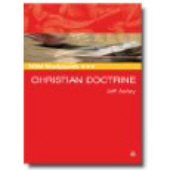
Jeff Astley, SCM Studyguide to Christian Doctrine
SCM Press, 2010
ISBN-10: 0334043247 ISBN-13: 978-0334043249 250pp £19.99 Contents
The SCM Studyguide to Christian Doctrine:
• offers a clear introduction to Christian doctrine, pitched at undergraduate level one, while encouraging deeper reflection and further study;
• helps students to recognise the wide canvas of Christian doctrine by including a range of different theological positions;
• encourages interaction with the reader by the development of theological conversations between his or her own ‘ordinary theology’, on the one hand, and the theological resources of ecclesiastical and academic theology, on the other;
• starts with doctrines that relate to the more concrete experiences of Christian discipleship and worship, before moving to more abstract theological topics;
• employs ‘Coming to Terms with Theology’ boxes to provide succinct explanations of technical theological terms.
The book opens with three chapters examining the general nature of Christian doctrine, its setting and sources, and the language it uses. It then surveys the major areas of doctrine, beginning with teaching related to concrete experiences and behaviour within the Church. The doctrinal journey then travels through the themes of Christian salvation, responses to Christ, and God’s role in the world; before exploring the more abstract terrain of God’s mysterious reality and our ultimate destiny.
‘Jeff Astley has provided the doctrine volume missing from SCM’s largely excellent Studyguide series. His contribution is up to the standard of the best of these books. He writes fluently and clearly, with pleasing turns of phrase. The style is marked by profuse use of quotations. These are consistently well chosen . . . The centre of gravity is Anglican, but gently so. . . . Astley begins with theological methodology. This may not be where the complete beginner would want to start, but he soon engages the reader by relating methodology to questions that reflective churchgoers are likely to have asked themselves. Then come chapters on the Church and the relation of theology to Christian practice [that] are particularly strong. . . . The theological tone represents a confidence in broadly traditional positions combined with a willingness to survey the other options that have been put forward. The result has more of a sense of coherence than this commitment to breadth might suggest. Sometimes he is fairly categorical about the virtues of the orthodox view, especially in Christology. When it comes to creation and the doctrine of God, however, he is more willing to leave startlingly divergent opinions in play. . . . The chart of Christological positions . . . is a surprisingly useful summary’ (Church Times). ‘As someone who teaches an introductory course on doctrine I am always on the lookout for new books which are stimulating, accessible and which help students to see how second-order theological thinking and language are compatible with, and even helpful to, the life of faith and the practical demands of ministry. Astley’s work in “ordinary theology” equips him to undertake this task with particular skill, and he organizes his SCM Studyguide . . . beginning with the more concrete and experiential [doctrines] before moving on to abstract processes and concepts. This method is what marks the book out from the many other excellent introductions to doctrine on the market. . . . There are some excellent summaries of key doctrinal positions, for example, on the Eucharist, on sin and salvation, and on Trinitarian terms. Astley often goes further to offer additional interpretive possibilities, as with the section “Other Insights?” on models of atonement . . . Throughout it is apparent that this text is the work of someone who has been engaged with theological concepts and with other human beings grappling with these concepts for a very long time, and who is at home in finding ways of communicating complex ideas in clear and varied ways. . . . [This is] a book that is ambitious, wide-ranging, engaging and aware of the need to keep doctrine rooted in wider Christian existence. It will be appearing on my students’ reading list this year and for years to come’ (Journal of Adult Theological Education). ‘Astley’s introductory text to theology is a masterpiece of clarity and an excellent contribution to the SCM “Studyguide” series. . . . This is no dry and dusty tome, as chapter headings themselves amply indicate. . . . Chapter 7 moves into the Christological minefield [where] Astley’s pedagogical strengths triumph. I do not think I have ever come across such a clear, albeit pithy yet . . . sensible and helpful presentation of the myriad of options and alternatives for interpretation and theological understanding. Standard Christological ‘isms’. . . are succinctly summarized. Outlines of the classical solutions to the dominical question – Who do you say I am? – are a godsend for the instructor of an introductory course to this most vexed arena of Christian theology. . . . The end of this book marks but the reader’s commencement of a journey into a deeper exploration of this mystery having gained a firm grounding, orientation and compass upon which to set out. And, in the process of being so equipped, the reader has been introduced to a range of excellent Christian thinkers and authors, for another of the strengths of this work is the substantial use made of apposite quotations from a most impressive selection of theologians. Thus the attentive student has not only been introduced to the range and nature of theology as a subject, but to a balanced range of classic and contemporary Christian thinkers, supported by a most comprehensive bibliography and helpful further reading section. This book will make an excellent beginners’ text – the purpose for which it was designed – but also a useful basis for more advanced discussion groups of what Astley is pleased to call “ordinary theologians”. . . And for many ordained, this book provides a helpful refresher and a useful reference’ ( Reviews in Religion & Theology). The text ‘provides a rich introduction to the different aspects of studying the beliefs of Christian faith . . . As well as being an excellent introduction, I suspect that this is a book that students of theology will refer back to each time that they start a new topic, or to remind themselves of some of the main aspects of particular Christian doctrines. The most significant contribution of this book, however, is the tone that it sets for studying theology. The reader is very clearly invited to take responsibility for her or his own learning and beliefs, as well as being encouraged to contribute to the rich and dynamic conversation which is Christian theology’ (Modern Believing). ‘I’ve just read Jeff Astley’s new book on Doctrine in the SCM Studyguide series (aimed at undergraduate level 1). I wish it had been around when I was starting out! It is clearly the fruit of someone practised at teaching doctrine. It aspires to encourage the reader to engage in “theological conversations between their more ‘ordinary theology’, on the one hand, and the varied resources of ecclesiastical and academic theology”. I believe that it will succeed in this aim. Its combination of deceptively simple exercises, which enable reflection on profound theological themes without going near academic theological jargon, and bite sized nuggets of clearly explained academic theology should lead to many fruitful conversations between tutors and students (and may be appropriated outside the classroom)’ (Tim Ling, Friday Mailing, May 2010).
Exploring Faith: Theology for Life Series
Designed for individuals and groups involved in adult Christian education / education for discipleship, and others beginning the study of Theology or Religious Studies, the series is used in a number of distance-learning programmes. Well over 20,000 copies sold to date.
Series Editors: Leslie J Francis and Jeff Astley
‘These books should be on every Christian leader’s bookshelf . . . . invaluable for lending to church people who want to explore their faith further . . . . worth every penny’ (Ministry Today). ‘Together these books probe, teach, explore, help and nudge us in a direction of a theological understanding.’ ‘Helpful, well-balanced resources for facilitating group discussion’ (Journal of Beliefs and Values). ‘Exploring Faith: Theology for Life is an excellent new series . . . [which] provides a broad and accessible introduction to theology in all its aspects for any Christian who is prepared to bring their minds to what they believe’ (TransMission).
NEICE-authored titles:
Jeff Astley, God’s World
Darton, Longman and Todd, 2000
ISBN: 0 232 52367 3 124pp £7.95 Contents
Jeff Astley, Choosing Life? Christianity and Moral Problems
Darton, Longman and Todd, 2000
ISBN: 0 232 52368 1 132pp £7.95 Contents
Bridget Nichols, Literature in Christian Perspective: Becoming Faithful Readers
Darton, Longman and Todd, 2000
ISBN: 0 232 52379 7 125pp £7.95 Contents
Jeff Astley, Exploring God-Talk: Using Language in Religion
Darton, Longman and Todd, 2004
ISBN: 0 232 52519 6 143pp £9.95 Contents
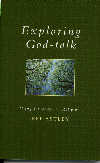
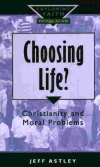
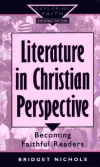
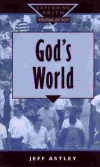
God’s World is ‘clearly and well written’ and ‘provides an excellent introduction’ (Ministry Today). ‘It offers a good introduction to the major themes of philosophical theology’ (Church Times). ‘Jeff Astley . . . . writes lucidly, succinctly and fairly comprehensively.’ ‘This is a fine introduction to a vital area of Christian thought’ (Epworth Review). ‘God’s World is a theological primer, well ordered, very concentrated and lucid and offering a good starting point for considering a range of theological issues.’ ‘There is a sensitive discussion of the implications of different views of God as creator in determining Christian responses to the environment’ (Green Christians).
Choosing Life? ‘fulfils the purpose admirably. It is a succinct but comprehensive introduction to Christian ethics . . . . [Moral] issues . . . are introduced with an objectivity which encourages discussion’ (Methodist Recorder). It ‘could be given to anyone in our congregations who wants to think about the questions and decisions we face in our everyday lives and to do so in a Christian context’ (Ministry Today). This ‘pre-eminently judicious book’ sheds ‘a cool, clear and even light . . . on every question of method and every moral issue that it touches.’ ‘In all the feats of compression achieved by this book it does not strike an obscure or false note’ (Anvil). ‘This product appears to be distinctly aimed towards the non-academic; however Jeff Astley’s skill with words and theological understanding makes it a brilliant read . . . Astley gives great insight into various aspects of moral decision making and ethics, and utilises case studies to engage the reader’s thought’ (Theology for Life).
Literature in Christian Perspective is a book that ‘reflects the depth of [the author’s] scholarship in both literature and theology as well as her practical understanding of the challenges facing beginners in those fields’, striking ‘a rare balance of accessibility and rigour’ (Christianity and Literature). ‘Careful reading of the text and attention to the very useful exercises is stimulating, provocative and creative. Beginners will find it helpful because of its steady progression. Some of its insights would enrich many a sermon and it could form an excellent basis for a series of discussion groups or a more traditional and demanding course of study on religion and literature. . . . Well worth buying’ (Revd Alec Gilmore).
In Exploring God-Talk, Jeff Astley has ‘added a valuable volume to his two earlier contributions to the series. . . . [He] is admirable at introducing the reader to the ideas and insights of a wide range of modern thinkers. . . . [and] his accounts of their views and arguments are much more readable and comprehensible than the passages he cites from their works. . . . The value of the book is not only in what it says, but in the tasks it sets’ ( Church Times). This ‘useful and wide-ranging book . . . . should certainly be in the bibliographies of those responsible for post-ordination and reader training. But it is to those who have never given much thought to the way they speak to God, and the way in which they believe God speaks to them, that Exploring God-talk will offer a real journey of discovery’ (Praxis News of Worship).’ ‘An excellent introduction to religious language, introducing the reader to often complex debates in an accessible way and keeping the reader interested and engaged’ (Rural Theology). ‘Jeff Astley . . . applies his well-known commitment to the theological education of the laity to this complex field . . .with considerable success. . . . There is an excellent summary of the use of figurative language . . . , as well as a fine introduction to hermeneutics. . . . It is a reliable introduction to many issues in theology and the philosophy of religion’ (The Expository Times). ‘Exploring God-Talk is . . . lucid, informative, and richly illustrated by an array of examples, exercises, and illustrations. It is also based on vast erudition and careful reflection on a broad range of personal experiences. . . . The book contains an excellent account . . . of the complex and potentially confusing topic of analogical God-talk. Any student of religious language would benefit enormously from this chapter, and indeed, from the insightful exposition of Wittgenstein. . . . Anyone bothering to read, study, and discuss Jeff Astley’s latest book would be amply rewarded and ably instructed’ (New Blackfriars).
Other titles in the series:
Ruth Ackroyd and David Major, Shaping the Tools: Study Skills in Theology
Darton, Longman and Todd, 1999
ISBN: 0 232 52342 8 123pp £7.95
Michael West, Graham Noble and Andrew Todd, Living Theology
Darton, Longman and Todd, 1999
ISBN: 0 232 52348 7 105pp £7.95
Robert Evans, Using the Bible: Studying the Text
Darton, Longman and Todd, 1999
ISBN: 0 232 52344 4 132pp £7.95
Alastair Redfern, Ministry and Priesthood
Darton, Longman and Todd, 1999
ISBN: 0 232 52339 8 128pp £7.95
Philip Richter, God’s Here and Now: Social Contexts of the Ministry of the People of God
Darton, Longman and Todd, 1999
ISBN: 0 232 52346 0 125pp £7.95
Alastair Redfern, Being Anglican
Darton, Longman and Todd, 2000
ISBN: 0 232 52369 X 140pp £7.95
William Strange, The Authority of the Bible
Darton, Longman and Todd, 2000
ISBN: 0 232 52370 3 117pp £7.95
John Holdsworth, Communication and the Gospel
Darton, Longman and Todd, 2003
ISBN: 0 232 524888 2 131pp £8.95
Nicola Slee, Faith and Feminism: An Introduction to Christian Feminist Theology
Darton, Longman and Todd, 2003
ISBN: 0 232 52486 6 142pp £8.95
Leslie J Francis, Faith and Psychology: Personality, Religion and the Individual
Darton, Longman and Todd, 2005
ISBN: 0 232 52544 7 167pp £10.95
Problems in Theology Series
Series Editors: Jeff Astley, David Brown and Ann Loades.
At both degree level and A-level, courses in theology and religion are increasingly ‘problem based’ and form part of modular programmes of study. In this context, many textbooks and anthologies of readings are too general to be of more than limited value, and teachers and students often find it difficult to access relevant primary material for the different topics they select for in-depth study.
The rationale of this series is to provide, inside the covers of one volume, carefully selected readings together with introductory overviews and bibliographies that have been designed to meet this need. A particular advantage of this format is that a teacher or student can use the material selectively, constructing their own educational pathways through the literature.
Titles published:
Jeff Astley, David Brown and Ann Loades (eds), Creation: A Reader
T & T Clark, 2003
119pp ISBN: 0 567 08977 0 (pbk) £12.99 ISBN: 0 567 08978 9 (hbk) £40
Jeff Astley, David Brown and Ann Loades (eds), Evil: A Reader
T & T Clark, 2003
112pp ISBN: 0 567 08975 4 (pbk) £12.99 ISBN: 0 567 08976 2 (hbk) £40
Jeff Astley, David Brown and Ann Loades (eds), War and Peace: A Reader
T & T Clark, 2003
111pp ISBN: 0 567 08973 8 (pbk) £12.99 ISBN: 0 567 08974 6 (hbk) £40
Jeff Astley, David Brown and Ann Loades (eds), Science and Religion: A Reader
T & T Clark International, 2004
126pp ISBN: 0 567 082 431 (pbk) £12.99 ISBN: 0 567 082 539 (hbk) £40
Jeff Astley, David Brown and Ann Loades (eds), God in Action: A Reader
T & T Clark International, 2004
125pp ISBN: 0 567 082 237 (pbk) £12.99 ISBN: 0 567 082 334 (hbk) £40
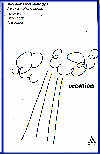
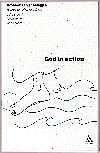
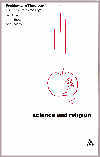
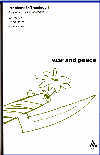
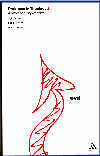
‘They will be of immense benefit to hard-pressed theology students – the readings are brief, well-chosen and drawn from across the tradition . . . Unlike many similar readers there does not seem to be a particular ideological slant. . . . All in all these books are to be highly recommended to those embarking on the study of theology’ (Modern Believing). ‘A useful series’ (Theology Today). The series ‘contributes to the revival of theology as an exciting option for undergraduates’ (Church Times).
Creation: A Reader is ‘a selection of primary readings that reflect the breadth of theological conviction on . . . issues relating to the doctrine of creation, providing a most helpful orientation for students . . . as well as an excellent starting point for further investigation’ (Professor John Franke). It ‘is a great book for teachers and students who wish to look at current issues concerning the theology of creation’ (Ashland Theological Journal). ‘The . . . excerpts allow the reader to participate in fifty years of theological conversation and . . . [to] share her own voice’ (Religious Studies Review).
Evil: A Reader is ‘a very useful collection, judiciously selected and more comprehensive in its coverage than others in the same field’ (Professor John Hick).
War and Peace: A Reader is ‘an outstanding resource for students and teachers of religion and Christian theology’ (Professor John Franke).
God in Action: A Reader ‘occupies a worthy place in a comprehensive series. . . . Each chapter is excellent and varied according to intellectual taste and practical usefulness. . . .Throughout the book the editors have been punctilious in presenting different views and have been careful not to give “answers” . . . . There is first-rate material here for ecumenical study’ (The Expository Times).
Science and Religion: A Reader is ‘a commendable introduction to the key issues. . . . This volume will be an essential part of any booklist in a course on science and religion . . . [as] a quick and accessible introduction . . . It may even be a book which could resource a church discussion group’ (Anvil); ‘[For] many courses at university level on science and religion . . . a text like this is invaluable. . . . It would [also] form a useful study book for a church discussion group’ (Revd Dr Michael Parsons, Executive Director, Ian Ramsey Centre; Principal, WEMTC).
Key Readings in Christian Thought
Jeff Astley, David Brown and Ann Loades (eds), Christology: Key Readings in Christian Thought
Westminster John Knox Press / SPCK, 2009
xii + 131pp ISBN-10: 0 664 23269 8 ISBN-13 978 0 664 23269 6 (pbk) $24.95 WJK Press
ISBN-13 978 0 281 06184 6 (pbk) £12.99 SPCK
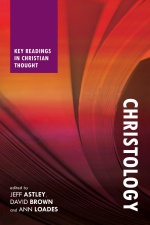
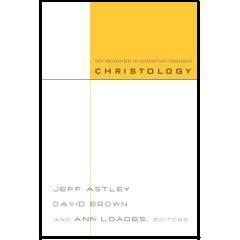
This book is designed to meet the needs of today’s teachers and students of Christian theology. Focusing on specific doctrines and themes, the book includes selected primary readings that track the development of the doctrine of Jesus Christ, including the important questions and debates surrounding it. Selections consider both the person and the work of Christ. Topics include the development of classic Christology from its biblical roots through patristic debates, responses to the modern distinction between the Jesus of history and the Christ of faith, the understanding of incarnation as kenosis, and the critical and constructive developments of liberation and feminist theologies. The book includes a full bibliography, and each chapter includes topics for further discussion.
‘Christology offers readers a window into some of the most influential and representative discussions of the doctrine of the person of Christ . . . . The readings highlight the diversity of Christian thought, and they range from ancient to modern, from Eastern to Western, and from conservative to liberal. Emphasis has been given to writings that were especially influential or are representative of a key perspective. Educators should find this volume extremely useful . . . . those who work through these readings will be rewarded with insight into the minds of some of Christianity’s finest thinkers.’ ( Theological Book Review)
Ideas and Perspectives
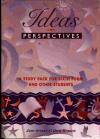
A teaching pack focused on ten ethical, philosophical and religious issues: Prejudice and Discrimination, How Do We Know What to Do?, Crime and Punishment, Live Dilemmas, Freedom, Science and Faith, Power and the People, It’s Not Working Unless it’s Hurting, The Variety of Beliefs, How Do We Know? The pack comprises: Teacher’s Notes, nineteen photocopiable worksheets and ten copies of the Student’s Booklet. Suitable for A/AS level General Studies and Sixth Form RE.
Jeff Astley and Dick Hobson, Ideas and Perspectives: A Study Pack for Sixth Form and Other Students
(London: Hodder & Stoughton, 1994)
ISBN: 0 340 58797 0 11 x 16 pp plus 19 worksheets £28.50
See also Books of Popular/Ordinary Theology and Spirituality for more popular publications.
See also Theory and Research in Christian Education and Practical Theology, Explorations in Practical, Pastoral and Empirical Theology Series and Religion, Education and Culture Series for publications on Christian Education, Religious Education and Practical Theology.
